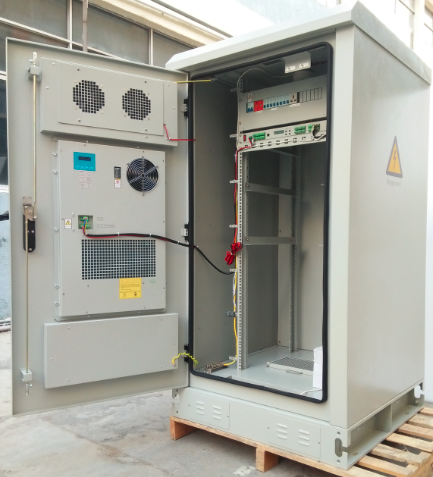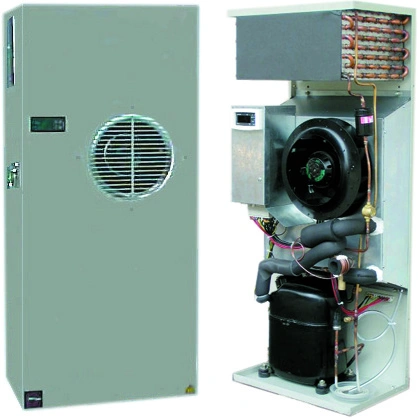Which is Better for Outdoor Telecom Cabinets Air Conditioner or Fan Cooling

Comparing Cooling Solutions for Telecom Cabinets
Explore the best cooling options for outdoor telecom cabinets.
Features | Air conditioner for outdoor telecom cabinet | Fan cooling system for outdoor telecom cabinet |
|---|---|---|
Cooling Efficiency | Maintains steady temperature and humidity. | Effective in mild weather, less control. |
Energy Consumption | Uses more energy, but efficient cooling. | Lower energy use, cheaper to run. |
Maintenance Needs | Requires regular filter and part checks. | Easier maintenance, fewer parts to check. |
Cost | Higher initial cost and running expenses. | Lower purchase and operational costs. |
Environmental Suitability | Works well in extreme conditions. | Best for stable, mild climates. |
Humidity Control | Effectively removes excess moisture. | Does not manage humidity well. |
Longevity | Lasts longer with proper maintenance. | May wear out faster in harsh conditions. |
Cooling Capacity | High cooling capacity for extreme heat. | Limited cooling in high temperatures. |
Outdoor telecom cabinets need good cooling to work well. An air conditioner for outdoor telecom cabinet provides precise control of temperature and humidity, making it ideal for extremely hot or cold weather. While fan cooling systems are more effective in mild conditions and are less expensive, the best choice ultimately depends on the weather, cooling requirements, and budget. Selecting the right system ensures your equipment remains safe and operates efficiently.
Key Takeaways
Air conditioners keep temperature and humidity steady, great for tough weather.
Fans are cheaper and save energy but work best in mild weather. They may not handle high heat or humidity well.
Air conditioners need regular care to last long and work well. Fans need less care but can have problems in dusty or wet places.
Pick the right cooling system based on your weather, money, and ability to maintain it.
Hybrid systems save energy by mixing air conditioning and fan cooling benefits.
Key Factors to Consider
Cooling Efficiency of Air Conditioner for Outdoor Telecom Cabinet
Air conditioners are great at keeping temperatures steady. They help telecom equipment stay cool and avoid overheating. Modern air conditioners use less energy but still cool well. This makes them a good choice for places needing strict temperature control.
Metric | Description |
|---|---|
Temperature Regulation | Keeps equipment cool to stop overheating problems. |
Humidity Management | Removes extra moisture to protect from water damage. |
Energy Efficiency | New models save energy while cooling effectively. |
Reliability | Regular checks keep them working well and avoid breakdowns. |
Studies show the need for better cooling as the Earth warms. Cities have gotten 1.5°C hotter in recent years. Air conditioners are reliable in extreme weather. They control both heat and humidity, making them very useful. Smart tech, like IoT sensors, helps monitor and adjust settings. This lowers failure rates by 25%, keeping systems running smoothly.
Environmental Suitability of Fan Cooling System for Outdoor Telecom Cabinet
Fan cooling works best in mild weather. It moves air to cool equipment, which works well in stable climates. But in very hot or humid places, fans may not work as well. High heat and moisture can cause overheating and damage parts. Fans might not be reliable in such conditions.
In areas with steady temperatures, fans are a cheaper option. They are simple and use less energy. But they don’t control temperature and humidity like air conditioners. In dusty or wet places, fans may not perform well over time.
Energy Consumption and Cost Comparison
Energy use and cost are important when picking a cooling system. Air conditioners use more energy than fans. But they offer better features like temperature and humidity control, which are worth it in tough conditions. Hybrid systems mix air conditioning with other methods to save up to 30% energy in hot areas.
Fans use less energy in mild climates, making them cheaper to run. However, their weaker cooling might lead to higher repair costs if equipment overheats. It’s important to balance energy savings with performance when choosing between these systems.
Advantages and Disadvantages

Pros and Cons of Air Conditioner for Outdoor Telecom Cabinet
Air conditioners give exact cooling and control moisture well. This makes them great for outdoor telecom cabinets in tough weather. They work best where heat or high moisture can harm equipment. But they need regular care and use more energy than fans.
Advantages:
High Cooling Capacity: Air conditioners handle extreme heat, keeping equipment safe.
Humidity Control: They remove extra moisture, stopping rust or water damage.
Versatility: They work in very hot or humid places easily.
Disadvantages:
Maintenance Needs: Filters and parts need regular cleaning to work well.
Energy Consumption: They use more power, raising costs in low-power areas.
Ambient Temperature Limitation: They can’t cool below the outside temperature.
Feature | Air Conditioners | Fan Cooling Systems |
|---|---|---|
Advantages | Strong cooling, works in many conditions | Good for mild climates, cheaper option |
Disadvantages | Needs more care, limited by outside temperature | Weak cooling, needs frequent filter changes |
Pros and Cons of Fan Cooling System for Outdoor Telecom Cabinet
Fan cooling is a cheaper way to cool outdoor telecom cabinets. It moves air to stop heat buildup, working well in mild weather. But it doesn’t cool as much or control moisture, which can be a problem in harsh conditions.
Advantages:
Low Cost: Fans are cheap to buy and run, saving money.
Energy Efficiency: They use less power, cutting down costs over time.
Simplicity: Easy to set up and take care of due to simple design.
Disadvantages:
Limited Cooling Capability: Fans don’t work well in very hot or wet places.
Filter Maintenance: Dusty areas need frequent filter cleaning to avoid problems.
Environmental Sensitivity: Fans don’t work well in changing or dirty conditions.
Cooling Technique | Effectiveness | Complexity and Cost |
|---|---|---|
White oil paint | Cuts down heat from the sun | Low |
Internal circulation fans | Helps improve cooling | Moderate |
Air-to-air heat exchangers | Best cooling option but expensive and complex | High |
Both systems have good and bad points. Air conditioners cool better and control moisture but cost more and need more care. Fans are cheaper and save energy but don’t work well in tough weather. Pick the one that fits your project’s needs and budget.
Maintenance and Longevity
Maintenance Needs of Air Conditioner for Outdoor Telecom Cabinet
Air conditioners need regular care to work their best. Cleaning filters and checking refrigerant levels are important tasks. Inspecting electrical parts helps avoid breakdowns and costly repairs. Standardized maintenance makes these tasks easier and more consistent. Checking heat dissipation regularly also improves reliability and lifespan.
Good cooling protects telecom equipment from overheating. Cabinets with great heat control, paired with air conditioners, work better. This setup lowers the chance of overheating and helps equipment last longer.
Maintenance Needs of Fan Cooling System for Outdoor Telecom Cabinet
Fans are easier to maintain than air conditioners. They have fewer parts, so they break less often. But in dusty or wet places, fans need frequent cleaning. Dirty fans can clog and block airflow. Checking fan blades and motors keeps them working well. Fans are simple to care for, but skipping maintenance can cause problems.
In mild weather, fans are a cheap and low-maintenance option. However, dust and moisture can hurt their performance over time.
Longevity and Durability Comparison
Air conditioners last longer if cared for properly. They control temperature and humidity, protecting equipment from damage. But their complex parts may need replacing sometimes to stay durable.
Fans are simpler but may wear out faster in tough conditions. Dust, moisture, and temperature changes can damage them. In mild climates, fans can work well for years with basic care. But their weaker cooling might strain equipment, shortening its life.
Air conditioners are better for harsh conditions. Fans are cheaper and simpler for mild weather. Choose based on your needs and environment.
Recommendations Based on Use Cases
High-Temperature and Extreme Conditions
In very hot places, reliable cooling is important. Air conditioners work well in these conditions. They keep the temperature and humidity steady. This stops telecom equipment from overheating and getting damaged. For example:
Below 27°C, equipment works best.
At 32°C, it meets the A1 standard for IT gear.
At 35°C, it’s still safe to use.
At 40°C, caution is needed, and fans stop working well.
Temperature (°C) | Effect on IT Equipment |
|---|---|
< 27 | Best performance |
32 | Meets A1 standard |
35 | Safe to use |
40 | Be careful, fans don’t work well |
If your cabinets are in very hot areas, air conditioners are better. They give steady cooling and protect equipment from heat problems.
Cost-Sensitive and Budget-Conscious Projects
For tight budgets, fans are a cheaper option. They cost less to buy and run. Fans work well in mild weather and save money on maintenance. But they don’t work well in extreme heat. If your equipment is in a stable climate, fans can cool it without costing much.
Air conditioners cost more upfront and use more energy. But they are better for tough conditions. They last longer and prevent equipment failures. Spending more on air conditioners can save money in the long run by avoiding repairs.
Areas with Limited Power Supply
In places with little power, energy use matters a lot. Fans use less energy, so they are good for areas with weak electricity. They don’t overload the power supply and work well in remote places.
Air conditioners use more power but can still work in low-power areas. Using energy-saving systems, like hybrids, can cut energy use by 30%. If you need precise cooling in a low-power area, choose energy-efficient air conditioners or hybrid systems.
Dusty or Humid Environments
Dusty and humid areas can harm telecom cabinets. These conditions may damage equipment, lower performance, and shorten its life. Picking the right cooling system keeps your cabinets safe and working well.
Air conditioners work great in dusty or humid places. They use sealed cooling to block dust and moisture from entering. This protects delicate parts from harm. Air conditioners also control humidity, stopping rust and corrosion. For example, in coastal areas with high humidity, stainless steel cabinets and air conditioners last longer. But air conditioners need regular care, like cleaning filters, to work their best.
Fans are less useful in dusty or humid areas. They depend on airflow, which can pull in dust and moisture. Over time, this can clog filters and harm parts inside. Fans are cheaper and save energy but may not perform well in these conditions. They need frequent cleaning and filter changes, which adds to maintenance work.
Here are some factors to think about for cooling systems:
Environmental Factor | Description |
|---|---|
Material Selection | Use stainless steel for wet or coastal areas. |
Waterproof and Dustproof Ratings | Check for NEMA or IEC standards to block rain and dust. |
Temperature Control Management | Add heaters or dehumidifiers in cold or wet places to avoid damage. |
In dusty or humid areas, air conditioners protect equipment better. They keep harmful elements out and maintain stable conditions. Fans are cheaper but less reliable in tough environments. Think about your specific needs to choose the best cooling system for your telecom cabinets.
Picking the best cooling system depends on your needs. Air conditioners work well in tough weather. They control temperature and humidity precisely. However, they cost more to run. Fans are cheaper and use less energy. They are better for mild climates. Studies show advanced cooling, like liquid cooling, saves money. It can be up to 30 times more efficient than air cooling. Think about your environment, budget, and maintenance ability to decide.
FAQ
What is the main difference between air conditioners and fan cooling systems?
Air conditioners control temperature and humidity very well. They are great for very hot or cold places. Fans are cheaper and work best in mild weather. They are not good for extreme heat or moisture.
Which system is more energy-efficient?
Fans use less energy than air conditioners. They are good for places with limited electricity. Air conditioners cool better and may have energy-saving features. Hybrid systems can help lower their energy use.
How do environmental conditions affect the choice of cooling system?
Air conditioners work better in dusty or wet areas. Their sealed design keeps out dust and moisture. Fans depend on airflow, which can bring in dirt and water. This makes fans less effective in such places.
Are air conditioners more expensive to maintain than fan cooling systems?
Yes, air conditioners need more care. You must clean filters and check refrigerant often. Fans are simpler and need less maintenance. They are cheaper to care for, especially in mild weather.
Can I use a fan cooling system in high-temperature areas?
Fans are not good for very hot places. They cannot cool enough to stop overheating. Air conditioners are better for high heat. They keep equipment safe and working well.
CALL US DIRECTLY
86-13752765943
3A-8, SHUIWAN 1979 SQUARE (PHASE II), NO.111, TAIZI ROAD,SHUIWAN COMMUNITY, ZHAOSHANG STREET, NANSHAN DISTRICT, SHENZHEN, GUANGDONG, CHINA

